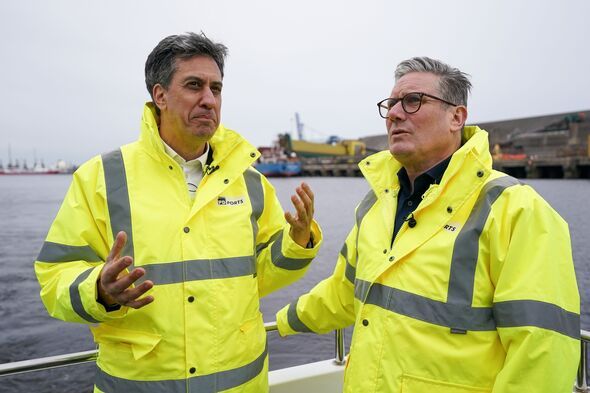

Ed Miliband's promises of a Britain basking in the glow of green-powered economic prosperity have been exposed as a fantasy.
We should be just five years away from net-zero nirvana where the UK booms on the back of 650,000 new high-skilled jobs while households see £300 lopped off their energy bills.
That was the election promise made by Labour when it laid out its plans to create Great British Energy.
But the pledges have been shown to be nonsense by none other than Miliband's own officials and a brutal intervention from Tony Blair's think tank.
Labour knew its big election promise to cut energy costs was bogus even before polling day.
One senior frontbencher told party officials he would not argue the case during broadcast interviews.
He admitted to me recently: "I knew it was b*****t so I wasn't going to defend it."
Labour did not include the £300 promise in its official announcement about GB Energy just a few weeks after winning the election.
Earlier this month, Keir Starmer was pressed on whether he stuck by the pledge and his response was a lot more woolly than when he was trying to win over voters, saying the figure is the government's "aim" and "what we are driving towards".
Officials in the Department for Energy Security and Net Zero warned years ago that meeting green targets will push energy bills higher before any possible reduction.
Their analysis found the cost of installing wind farms, solar farms and other schemes will inflate prices in the "short to medium term".
Miliband has not explained how the assessment, which predates his tenure but remains on a live webpage that was updated as recently as January, tallies with Labour's promises to cut bills.
Many have railed against uncompromising net-zero targets but Labour took the previous government's commitments and ramped them up, bringing forward plans for clean power by five years.
Part of the reforms to allow that to happen include "relaxing" the planning rules about where offshore wind farms can be installed.
But it has now emerged that one of Britain's biggest wind farms was paid £65 million to cut its output by nearly three quarters last year because there was not enough capacity in the grid to transport the power to where it was needed.
Octopus Energy boss Greg Jackson warned the system is reminiscent of the "wine lakes and butter mountains of the old European Common Agricultural Policy".
Meanwhile, a giant natural gas field discovered under Lincolnshire that could supply the country's energy needs for seven years will be left untouched, the government has said.
Labour promised GB Energy, which is costing £8.3 billion to set up, was part of its "Green Prosperity Plan to create 650,000 good jobs, cut bills by £300 on average and deliver real energy security".
But getting a clear explanation about the wildly expensive project has been difficult.
Tory Andrew Bowie captured the confusion and frustration about this probable white elephant, when he raised the issue in the Commons.
"In October it was claimed that GB Energy would directly employ 1,000 people; by November, that had fallen to 300 people. What is the figure, what are those jobs, where will they be based and what on earth will GB Energy actually do?"
Cabinet minister Ian Murray dodged every question.
Then last week, The Tony Blair Institute for Global Change spelt out clearly that the green industrial revolution will not provide the transformation being promised.
It warned that "even in a best-case scenario", green manufacturing is expected to employ around 425,000 people by 2050 - well below and long after the 600,000 promised by Labour.
The think tank said the transition was "unlikely to drive a revival of UK manufacturing jobs" and said the number of jobs created would not be enough to counter the 700,000 people currently employed in so-called grey industries, such as oil and gas.
"Betting everything on green growth would therefore be a mistake," it added.
The report went on: "The government must be careful not to overstate the job opportunities from green manufacturing."
This week, the climate change committee is expected to push for even tougher action to meet the net zero by 2050 pledge.
Miliband is so enamoured with wind power that he took a ukulele to Lindhurst wind farm near Mansfield where he gave a rackety rendition of Bob Dyland.
But it is hard not to conclude that the only thing blowing in the wind is taxpayers' cash and there is little sign that will change anytime soon.